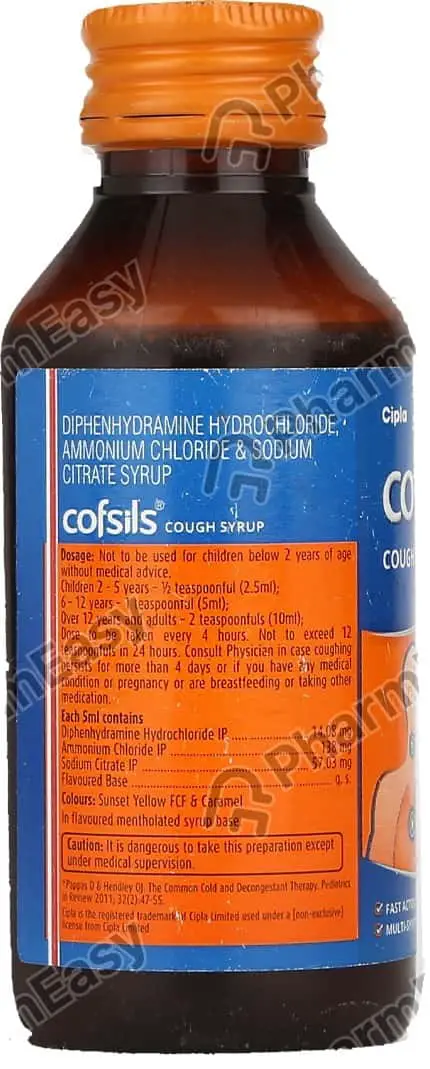Physical Address
304 North Cardinal St.
Dorchester Center, MA 02124
Physical Address
304 North Cardinal St.
Dorchester Center, MA 02124

Cough syrup is a medicinal syrup-like liquid that is typically flavored, non- or moderately narcotic, and used to treat coughs or soothe sore throats. This medication is designed to provide brief relief from upper respiratory allergies, hay fever, and the common cold-related cough, sneezing, and runny nose. The cough suppressant in this product is non-opioid (such as dextromethorphan or chlophedianol). To assist with cough control, it has an effect on the cough center in the brain.
Additionally, this medicine contains an antihistamine (such triprolidine, chlorpheniramine, or doxylamine), which blocks the effects of a particular natural chemical (histamine), which produces allergic symptoms. The primary function of cough lozenges, often known as cough drops, is to suppress the cough. When you suck on a cough drop, more saliva is produced in your mouth, which coats your throat and helps to lessen dryness. By doing so, this coating lessens the dry, itchy feeling that frequently results from sore throats or coughing.
Cough suppressant
In order to treat the symptoms of a dry, tickly, annoying cough, cough suppressants are typically employed. They lessen the cough reflex’s activity and stifle the impulse to cough. They function by stifling the dry, hacking cough that keeps you up all night long. ‘Antitussives’ is another name for cough suppressants. One popular antitussive on the market is dextromethorphan. These are frequently offered in pharmacies or chemist shops. Eg Benadryl DR , cofsils naturals cough syrup , esticof dry cough syrup. Etc
Multi- ingredient formulation
Treatment for several symptoms that accompany cough, such as a cold and a sore throat, is included in multi-symptom cough treatment. For the treatment of cough with several symptoms, pharmacies and chemist stores have multi-ingredient formulations.
Antihistamines
Antihistamines like Diphenhydramine are used to treat symptoms of hay fever, allergies, and the common cold, including runny nose, itchy, watery, and red eyes.Additionally, diphenhydramine is utilized to alleviate cough brought on by mild throat or airway irritation.
Expectorants
Expectorants are used to treat a wet cough, which produces mucus. They loosen the mucus, making it simpler for the body to discharge. The expectorant guaiphenesin is frequently employed.
BRANDS
DEXTROMETHORPHAN The cough suppressant dextromethorphan Hbr (hydrobromide) works especially well for dry coughs. Dextromethorphan, also known as DXM, is a component that targets impulses in the brain and central nervous system that cause the cough reflex, hence reducing the urge to cough.
GUAIFENESIN As an expectorant, guaifenesin aids in thinning and loosening the extra mucus in your airways. Guaifenesin is effective in treating chest congestion and makes it simpler to cough up secretions and breathe. †† You will feel less congested if you can cough up and expel more secretions from your respiratory tract. You should always use guaifenesin when treating a moist cough.
DIPHENHYDRAMINE Antihistamine diphenhydramine is used to treat cold, hay fever, and allergy symptoms.
Along with its intended effects, a medicine may also cause unwanted ones. Even though not all of these side effects are probable, if they develop, medical attention might be needed.If any of the following side effects manifest, consult your doctor as soon as possible:
Drug combinations should be taken with caution. In addition to expectorants and suppressants, many over-the-counter cough treatments also contain decongestants, antihistamines, or pain relievers. Pick items that contain only the drugs that address your symptoms. You don’t need a decongestant or painkiller if your symptom is merely a cough, for example. Check to determine whether any medications you take contain the same chemicals if you need to address several symptoms. A medication with the same ingredients should not be taken twice.
Ask your pharmacist or doctor if you have any queries.Go over the label. After selecting the best medication for you, carefully read the label to understand how to use it, common side effects, and any necessary warnings.